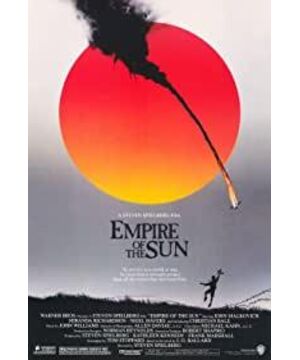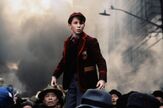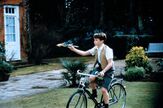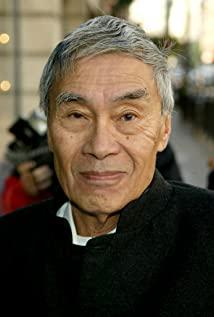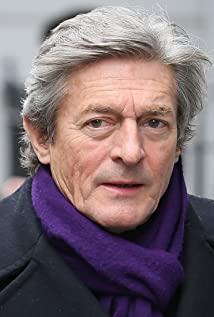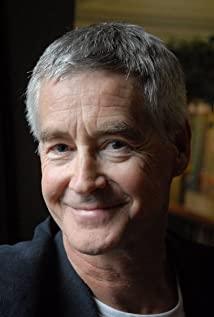In 1986, although Steven Spielberg's film "Purple" was nominated for 11 Oscars and never won one, Spielberg didn't seem to care, and he was very fortunate and satisfied with himself. Filmed this dialogue. In order to continue to get rid of his previous inherent mode, he decided to make another film based on the novel. He chose the autobiographical novel "Empire of the Sun" published by British writer J.G. Ballard in 1984, and asked Adapted from the screenplay by British playwright Tom Stoppard.
Ballard is known for writing revelatory science fiction, based on the author's experience, but not a realistic war novel, for it is full of rich imagery, listing Numerous visual equivalents of surreal effects: luxury and poverty juxtaposed, rich and hungry coexisting, warmth and violence fused, false exoticism interwoven with the chaotic real world, games juxtaposed with war, these are Spielberg Offers the first opportunity to tell a story "almost entirely through visual metaphor and uncontrived symbolism" since The Duel (1971). At the same time, thanks to Stoppard's careful adaptation, Spielberg retained a large number of narrative processes and dialogues in the original work, and fully tapped the emotional potential of the story, thereby creating a visually striking and impressive film. A psychologically deep war epic.
Spielberg, who is known for directing sci-fi and horror films and being good at figuring out the psychological world of children, brings grotesque and dreamy characteristics to this film. He portrays a child in a sentimental and dreamy tone - the protagonist Jimmy Graham's psychological state, full of warm and terrifying emotional world, his curiosity, fear and elation, his mania, depression and elation.
Compared with the original work, Spielberg deleted the very bloody and terrible plots of the war, and did not list all the horrors of the war, because it is easy to make people feel terrible and difficult to enter. Instead of treating the character of the boy as a vehicle for the audience's emotional endorsement, Spielberg takes the audience back to that era to experience rather than identify with it. He turned the dull emotions in the original work and the intricate and simple experience of a boy's growth into a display of the mental journey of a child who has lost his innocence and purity. , unstoppable, terrifying yet exhilarating, and sometimes horribly beautiful, adventures are surreal dreams, dream drills, not horrific disasters in the adult world. In other words, children have a stronger ability to bear suffering than adults, because they are splicing and assembling their own worlds. Adult disasters are seen by children as adventures or games. Therefore, the difference between adults' behavior and children's games is in war. It was temporarily bridged, and as a result, the child's "block world" was finally completely shattered. Jimmy, the wartime child separated from his parents in a foreign country, spent his early adolescence (about 11 to 15 years old) in a Japanese concentration camp, from a lively and innocent child to an emotionally numb, not a child Not an adult, either, when he was finally reunited with his parents, he made only a brief, happy look, a far cry from the usual warm and bright endings in films.
The themes of Empire of the Sun are similar to those of many of Spielberg's previous films: the intervention of some great anomalous force, the loss of civilization, the division of families, childhood dreams, fantasies and games, and lost childhood and misfortune . However, "Empire of the Sun" reverses the "Peter Pan complex" that runs through Spielberg's previous films for the first time. So, the film's 1988 box-office value was disappointing, but it was well received by critics who saw it as a sign of Spielberg's creative maturity, and, Jimmy's Personality much like Spielberg himself, the boy spent four long years in a concentration camp and was forced to mature prematurely because he was born into a chaotic world. The war taught Jimmy to snatch food and steal dead people's shoes to survive, and when the P-51 fighter-bombers arrived, he was frantic with excitement, screaming insanely: "How wonderful! I touched them! I felt it! Their body temperature! I can taste them with my mouth: oil and smokeless wire powder!" In addition, Spielberg had an accurate grasp of his childhood interests and hobbies. Like Jimmy, Spielberg was obsessed with flying as a child, liked to model airplanes and dreamed of flying. Flights and planes appear in many of Spielberg's films, such as: "1941" (1979), "Alien" (1982), "Halflight - The Movie (Second Part)" (1983) , "Indiana Jones Series" (1981, 1984, 1989), "Forever" (1990). However, "Empire of the Sun" is not a kind of slapstick portrayal as a foil plot. Spielberg has found a certain psychological distance between his personal interests and the film, in other words, he has matured. The real meaning of flight and airplane in the film lies in the possibility of the imagination and metaphor of flight. The airplane brought Jimmy a new and free imagination. The advent of war also shows that Jimmy is only flying in his imagination. He can throw a toy glider into the air, but he can't control its flight.
As a boy's "war dream", "Empire of the Sun" is closely related to Jimmy's game mentality. Jimmy was "an imaginative, bewildered, distressed kid who adored airplanes and couldn't distinguish his fantasy from reality." He traversed the concentration camp like a perverse hysterical patient, and his elated primitive fanaticism and adoration for the plane's unprincipled non-principle above good and evil beyond moral standards, all stemmed from the child's play mentality. Thus, the war became a dream in his reality, a game in his dream. Jimmy's room is full of models of airplanes, and his toy glider has been flying and gliding in the sky for too long to be a toy. The hallucination persists in reality: Jimmy didn't start the war, but his game of turning on and off the flashlight in the hotel seems to have led to the Japanese invasion. The hallucination had fatal consequences, and its line with reality completely collapsed. When the P-51 fighter-bomber bombed, Jimmy was so excited, cheering on the roof of an abandoned building despite the danger, the pilot smiled and waved at him from the open cockpit, like Jimmy's hallucination, the war is just like Jimmy designed game. "The film puts us in the distorted, dreamlike perception of his war-induced neurosis, not so much a realistic war film as a mania-- —a study of a boy’s grotesque war dreams —”. The film reveals the bizarre, absurd and comical nature of war through the description of Jimmy's maddened psychological world. In other words, the war in the film is both real and psychological. It is a reflection of the inner emotions of children and adults. It is inevitable that the behavior of the film is different from the psychological difference of the child, which is why the film has a grotesque and dreamlike nature. The coexistence of different worlds between fantasy and reality, between war games and actual combat, forms the structure of this film, which is a special structure with great tension in the free alternation and fusion of time and space : Arbitrary structure (i.e. dream structure).
The theme of "longing to go home" is also a recurring theme in Spielberg's films, and "Empire of the Sun" further emphasizes the important connection between the individual and belonging, and Jimmy's mania and depression stem from the loss of his family. Connection, while he lives with his parents in an Eden-like world of colonial privilege, he is carefree and living in a world of children's play. After being separated from his parents, Jimmy felt bitterly that he was an orphan. His greatest fear was that no one wanted him, no place to stand, that he could neither surrender to the Japanese nor sell to the Chinese. I don't want you, you're worthless." He was attached to Beth, who was selfish and kept him out of the door again and again, eager to find the shadow of his family from the Victor and his wife, and to find the memory of his father from Dr. Rollins. He convinced himself that he was a useful man, and when he pumped the chest of a dead woman in the hospital, he thought he had brought her back to life, which excited him, and was also fascinated later when he pumped the chest of a Japanese boy. Wildly repeating: "I can recall everyone!" The plane is the surrogate mother figure for Jimmy after he leaves his parents, and Jimmy turns to war fantasies to suppress his inner frustration. "Sleep, child, on my breast/It's warm and safe here/Your mother's arms are around you/Mother's love is surging in my breast/Fear will never come to you/Neither What disturbs your sleep/Sleep quietly, dear child/Sleep sweetly in your mother's arms". This is the "Welsh Lullaby" that Jimmy sings repeatedly in the film, and he just implicitly reflects Jimmy's thoughts on his mother and family. When the P-51 fighter-bombers bombed the concentration camp, Jimmy's depression reached a peak, his psychological defenses completely collapsed, and he told Dr. Rollins with tears in his eyes: "I can't remember the faces of my parents. Mom plays bridge in her room. I love watching her brush her hair, she's got black hair." Lying in Dr. Rollins' arms, Jimmy murmured, "I'm loved, you're loved. , he was loved." Unloved by the loss of his parents, the film reveals the psychological roots of Jimmy's mania and depression.
In Empire of the Sun, the sequence of shots is consistent with Jimmy's fantasy world, where he treats war as a children's game. As a result, the cut takes on a "game"-style drama, bringing a surreal, dream-like visual experience. As Jimmy plays in the falling plane, the still shots of the plane crashing on the lawn are edited together with the sudden movement of the camera at various angles, creating the illusion that he is really flying, which is similar to Jimmy's The footage of the toy glider flying obliquely in the sky for a long time and gliding are juxtaposed and edited together, creating the illusion of a crashed enemy plane flying into the sky to engage the toy glider.
The reason why "Empire of the Sun" can perfectly combine fantasy and reality is inseparable from Spielberg's frequent use of mobile photography. When Spielberg used mobile photography, people did not realize when the camera moved away. The main target, when is it moving to the target again. Fragments of the mobile photography of the dreamy drive to the Lockwoods for the grand Christmas masquerade ball, vividly embodying two different worlds: a warm, Eden-like dream world, and a poor, chaotic and violent one real world. Jimmy's Packard car slid silently on the streets of downtown Shanghai. The noisy crowd on both sides flashed past the car. A European nun nodded and smiled at Jimmy. The hawker's chicken left blood on the window. A beggar with a dirty face shouted at Jimmy: "No dad, no mom, no whiskey soda!" But there was a quiet atmosphere inside the car. The car drove in a narrow area crowded with people, like in a dream In the same way, the sedan becomes the dividing line between fantasy and reality, and there are two different worlds inside and outside the glass window.
The lullaby that is constantly heard in the film and the grotesque jingling music that appears in different scenes stylize the theme of the film.
Spielberg's use of light and shadow is excellent. In "Empire of the Sun" he prefers to express night, twilight and dawn, which is the transitional state between sleep and wakefulness, a kind of dream-like tone.
In 1988, "Empire of the Sun" was nominated for six nominations, including Best Art, Best Cinematography, Best Costume Design, Best Editing, Best Original Music, and Best Sound at the 60th Academy Awards. Empire of the Sun has a satisfyingly complex storyline that combines many of the timeless themes that Spielberg likes to write about. Spielberg and his films have come of age after gaining a certain psychological distance from personal distress.
View more about Empire of the Sun reviews


